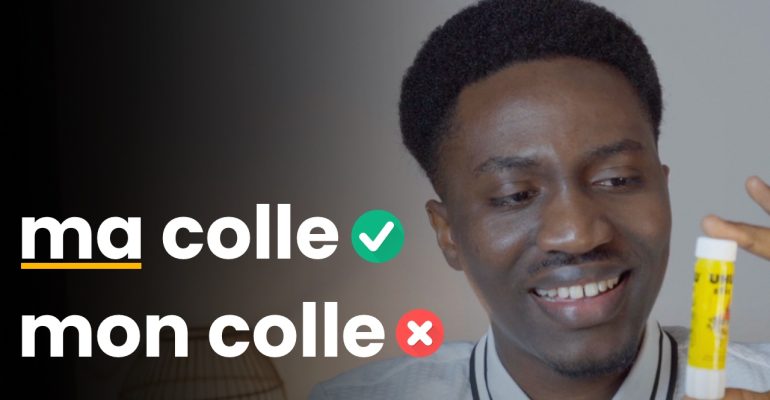Possessive adjectives in French
Possessive adjectives in French
Possessive adjectives are the linguistic tools that allow us to express ownership and relationships in a language. In French, mastering possessive adjectives is a key step towards fluency. In this blog post, we’ll delve into the intricacies of possessive adjectives in French, exploring their forms, agreements, and usage through detailed examples.
Click here to watch my video tutorial.
1. Understanding Possessive Adjectives:
Possessive adjectives are words that indicate ownership or relationships between individuals and objects. These adjectives agree in gender and number with the noun they modify, making them an essential component of French grammar.
2. Possessive Adjectives in French :
- Masculine Singular:
- Mon (my)
- Ton (your – informal singular)
- Son (his/her/its)
- Feminine Singular:
- Ma (my)
- Ta (your – informal singular)
- Sa (his/her/its)
- Masculine Plural:
- Mes (my)
- Tes (your – informal plural)
- Ses (his/her/its)
- Feminine Plural:
- Mes (my)
- Tes (your – informal plural)
- Ses (his/her/its)
Agreement with Gender and Number:
Possessive adjectives must agree with the gender and number of the noun they modify. This agreement ensures precision in expressing possession. For instance:
- Mon livre (my book) – masculine singular
- Ma maison (my house) – feminine singular
- Mes amis (my friends) – plural, regardless of gender
Notre, Votre, Leur (Our, Your, Their):
- Notre (Our):
- Notre maison (Our house)
- Notre famille (Our family)
- Votre (Your – Formal):
- Votre voiture (Your car)
- Votre livre (Your book)
- Leur (Their):
- Leur chien (Their dog)
- Leur appartement (Their apartment)
Possessive adjectives are frequently used in expressing familial relationships, ownership of objects, and emphasizing possession. For example:
- Ma mère (my mother)
- Ton frère (your brother)
- Notre maison (our house)
- Leur chien (their dog)
Possessive Pronouns with Body Parts:
When expressing that you’ve hurt yourself or a specific body part, reflexive pronouns are commonly used:
- Je me suis fait mal au bras. (I hurt my arm.)
- Il s’est cassé la jambe. (He broke his leg.)
- Elle s’est coupée la main. (She cut her hand.)
Possessive adjectives are fundamental to expressing ownership and relationships in French. By understanding their forms, agreements, and usage, learners can navigate the language with confidence. Whether describing family connections, indicating ownership of objects, or emphasizing possession, a comprehensive grasp of possessive adjectives is essential for effective communication in French. Practice incorporating these adjectives into your conversations to enhance your language skills and express ownership with precision.
Here are sample sentences using possessive adjectives in French:
- Masculine Singular:
- Mon frère a une voiture. (My brother has a car.)
- Ton livre est sur la table. (Your book is on the table.)
- Son chien est très mignon. (His/Her dog is very cute.)
- Feminine Singular:
- Ma sœur étudie à l’université. (My sister studies at the university.)
- Ta maison est grande. (Your house is big.)
- Sa voiture est rapide. (His/Her car is fast.)
- Masculine Plural:
- Mes parents habitent à Paris. (My parents live in Paris.)
- Tes amis sont sympathiques. (Your friends are nice.)
- Ses enfants sont intelligents. (His/Her children are intelligent.)
- Feminine Plural:
- Mes sœurs aiment voyager. (My sisters like to travel.)
- Tes chaussures sont jolies. (Your shoes are pretty.)
- Leurs idées sont intéressantes. (Their ideas are interesting.)
- Special Cases: Notre, Votre, Leur (Our, Your, Their):
- Notre maison est près de la plage. (Our house is near the beach.)
- Votre professeur parle plusieurs langues. (Your teacher speaks several languages.)
- Leur projet a été un grand succès. (Their project was a great success.)






